Graduate route: early insights evaluation
Published 15 July 2022
Authors: IFF Research and Home Office Analysis and Insight
Any enquiries regarding this publication should be sent to [email protected].
Background
Since the UK’s departure from the EU, and the end of the free movement accord, the Home Office introduced a new points-based system (PBS) as part of the new Future Borders and Immigration System (FBIS).
Graduates who have completed an eligible course of study can make an in-country only application for permission to stay in the UK for two to three years. This research provides important early insight into the Graduate route from individuals who have successfully applied to stay in the UK using the route.
The research will help the Home Office understand more about graduates’ decision-making and reasons for migrating to the UK, their experience of the visa application process, and their experiences so far of working and/or studying in the UK.
Methods
IFF Research, an external contractor, conducted 15-minute semi-structured telephone interviews with 50 Graduate route permission holders.
IFF Research carried out fieldwork between December 2021 and January 2022. The team initially emailed respondents inviting them to opt-in to the research via an online booking portal through which they provided their contact details and could indicate their preferred time(s) to be called for an interview.
About 17,400 people were contacted and screened to meet quotas based on nationality, UK country of residence, and qualification subject, level and type. The team sent target reminders to respondents living in Wales and Northern Ireland to boost opt-ins from these locations.
The data aims to reflect the variety of experiences of graduates, rather than statistically representing all Graduate route permission holders. Therefore, subgroup differences should be interpreted qualitatively, and should not be taken to represent statistically significant trends in the population overall.
The research team developed the questionnaire in partnership with the Home Office. It comprised a mix of pre-coded quantitative questions, with open-ended follow-ups after key questions. For open-ended questions, interviewers recorded verbatim responses and probed to obtain additional explanatory detail. The team tabulated the quantitative data for analysis and added open-ended responses to a qualitative analysis framework, which they analysed to draw out key themes and note illustrative quotes. Members of the IFF Data Services and Research Team iterative checked outputs for quality assurance.
Executive summary
How did applicants come to take up the Graduate route?
-
the most common way that graduates found out about the route was through their higher education institution – around half found out this way
-
the three most important factors when considering staying in the UK are: (1) the content of the Graduate route and what it allows you to do; (2) the appeal of the career/course they are pursuing; and (3) familiarity with the English language
-
the most influential feature of the Graduate route, when deciding whether to stay in the UK, is the flexibility it affords holders
How did graduates find the application process?
-
overall, feedback on the application process was very positive, with high levels of satisfaction
-
56% of respondents said that it was easy to find information about the Graduate route, whereas 30% said it was difficult
What will the Graduate route be used for?
-
respondents were overwhelmingly using the route to work – all respondents were either in employment, in self-employment or looking for employment
-
most are working in professional or associate professional level jobs and earning between £20k and £30k a year
-
the majority plan to extend their stay beyond the duration of their current visa; for many, this could mean switching to the Skilled Worker route
How is the UK’s new immigration system perceived by graduates?
- views on the application fee and health surcharge were mixed – around half thought they were fair, and half thought they were unfair
Demographics
Age
Close to half of surveyed graduates were aged 18 to 24. The average age of the sample at time of research was 26.
| Age bracket | Number of interviews |
|---|---|
| 18-24 | 23 |
| 25-34 | 20 |
| 35+ | 7 |
| Total | 50 |
Gender
More women were surveyed than men (58% vs 42%). The graduate sample population leans towards men (52%), so women are slightly overrepresented in the research.
Country of residence
| Country | Number of interviews |
|---|---|
| England | 28 |
| Scotland | 13 |
| Wales | 6 |
| Northern Ireland | 3 |
| Total | 50 |
Nationality
| Country | Number of interviews |
|---|---|
| Nigeria | 9 |
| India | 8 |
| China | 6 |
| Pakistan | 3 |
| Hong Kong Special Administrative Region of China | 3 |
| Bangladesh | 3 |
| USA | 2 |
| Malaysia | 1 |
| Other | 15 |
| Total | 50 |
Qualification level
| Qualification | Number of interviews |
|---|---|
| Undergraduate | 20 |
| Postgraduate | 30 |
| Total | 50 |
Qualification subject
| STEM/Non-STEM* | Subject | Number of interviews |
|---|---|---|
| STEM | Engineering and technology | 8 |
| Computing | 5 | |
| Biological and sport sciences | 3 | |
| Medicine/subjects aligned to medicine | 2 | |
| Non-STEM | Business and management | 9 |
| Creative arts and design | 7 | |
| Social sciences | 5 | |
| Law | 3 | |
| Other | 8 | |
| Total | 50 |
*Science, technology, engineering and mathematics
Qualification type
| STEM split | Number of interviews |
|---|---|
| STEM | 18 |
| Non-STEM | 32 |
| Total | 50 |
Graduate decision-making
Finding out about the Graduate route
The most common way that visa holders found out about the Graduate route was through their institution – around half found out this way.
Figure 1.1: How permission holders learned of the Graduate route
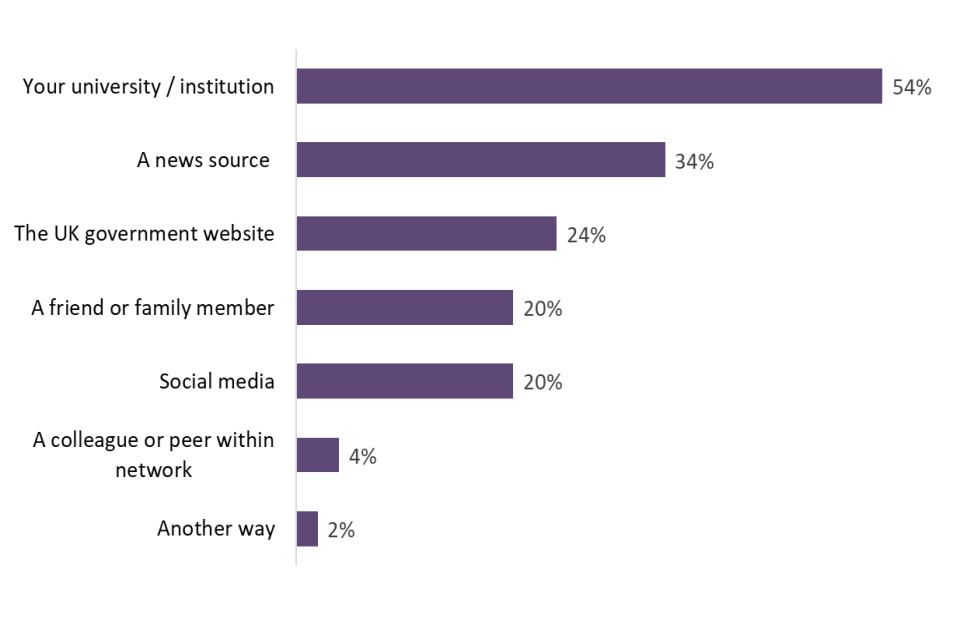
Notes:
- How did respondents find out about the Graduate Visa Route? (base=50)
Universities publicised the Graduate route through in-person support/advice sessions, webinars, PowerPoint presentation decks and email. Contacts at the universities providing information included university immigration services, international advisors, international students’ groups and university administrative staff.
Previous length of stay in the UK
Three in five (58%) had lived in the UK for over two years before becoming a Graduate route permission holder.
Figure 1.2: Permission holders’ length of stay in the UK previous to holding Graduate permission
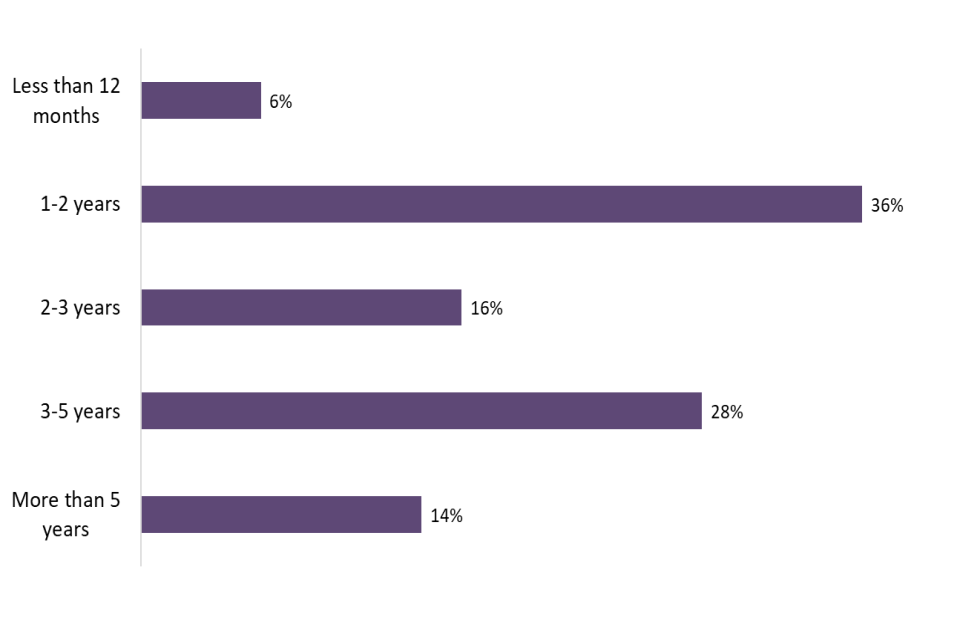
Notes:
- For how long did you live in the UK before holding Graduate Route permission? (base=50)
Impact of the Graduate route on applying to study in the UK
Over half of those surveyed stated the Graduate route did not influence their decision to apply to study in the UK at all and only 20% stated it influenced their decision a great deal. This remained the same across STEM/non-STEM and undergraduate/postgraduate.
Figure 1.3: Influence of the Graduate route on permission holders’ original decision to apply for a UK Student visa
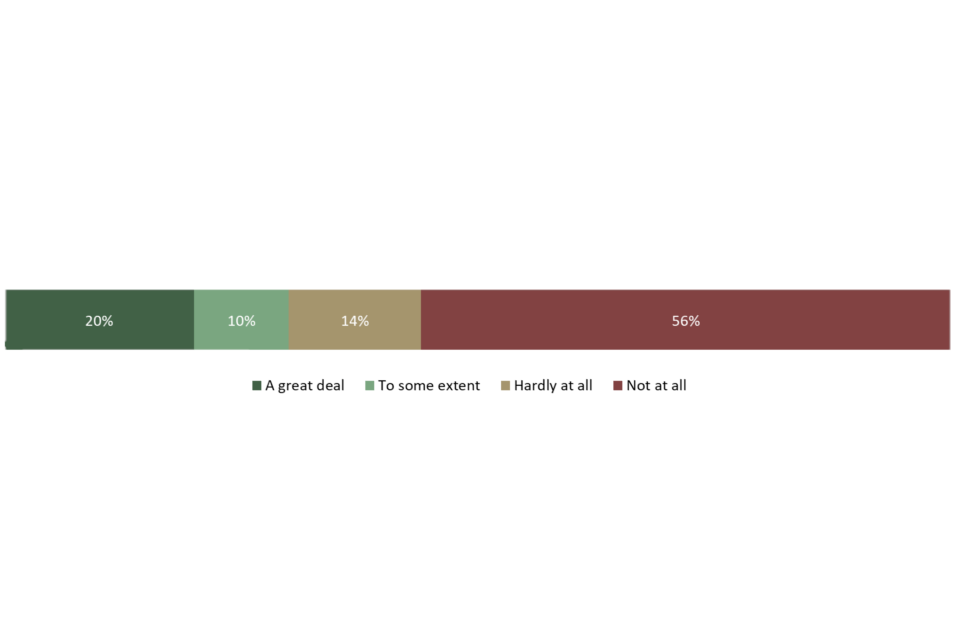
Notes:
- To what extent, if at all, did the availability of the Graduate Route influence your original decision to apply to study in the UK? (base=50)
Respondents applied for the Student route because of the quality of the UK education system, wide course availability, desirability of the UK to live and work, and as the only available option for them to stay in the UK.
“I wanted to study here in UK. It is the best country to study in. The standard of living is good here.” (Undergraduate, Non-STEM)
“I wanted to leave [Country of origin] and expand my career elsewhere because of the political situation there. The college I ended up studying at offered me a scholarship.” (Undergraduate, Non-STEM)
“I completed my A-levels in the UK so naturally I wanted to complete my degree in the UK.” (Undergraduate, STEM)
“I applied for Student route because Tier 2 visas are quite difficult to obtain for my sector. The bar for licenseship that companies need for sponsorship is too high for the salary threshold.” (Postgraduate, Non-STEM)
“Because the UK has excellent degree courses, and I secured a position at a university with very good reviews. I get to see parts of the world that I’ve always wanted to see.” (Undergraduate, STEM)
Notes:
- Why did you apply for the Student route? (base=50)
Options considered by permission holders before applying for the Graduate route
Permission holders were relatively open to both applying for other visas to remain in the UK and/or returning to their home country.
There were indications that those who had completed an undergraduate degree were more inclined to say they were considering returning to their home country than were postgraduate respondents (75% vs 47%).
Figure 1.4: Post-study visa options considered by Graduate permission holders other than the Graduate route
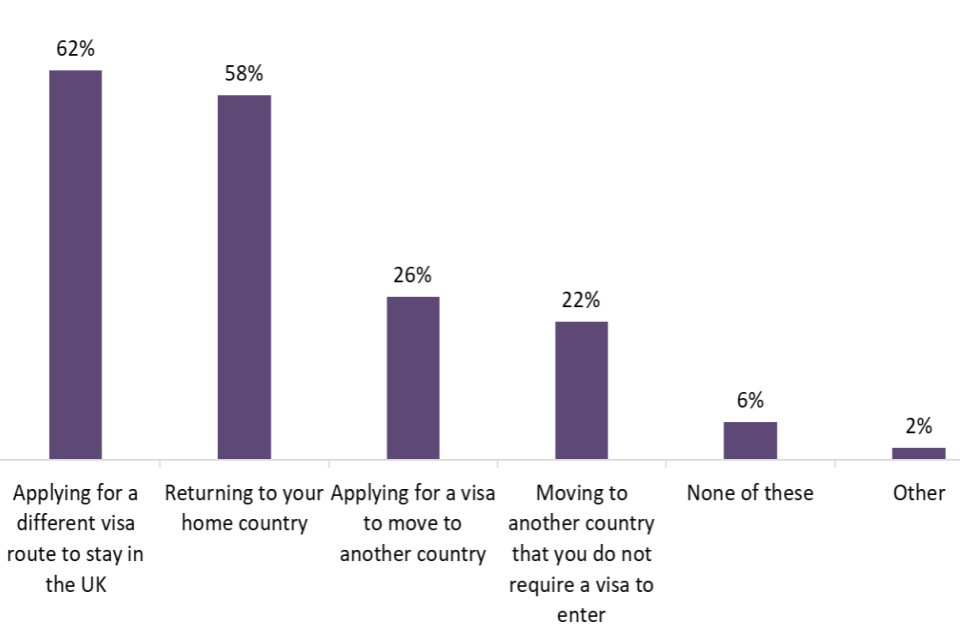
Notes:
- Before you applied for the Graduate Route which of the other following options were you also considering after your studies? (base=50)
The overwhelming majority of respondents would have chosen to study in the UK regardless of whether they could qualify for the Graduate route by studying elsewhere.
“The resources back home are not the same as the UK, and I’m also intending to have permanent residency, so being in the UK is better for my prospects.” (Postgraduate, Non-STEM)
“Yes - studying in the UK was the priority, not the visa, because the UK has the best courses in my field of interest.” (Undergraduate, Non-STEM)
“Yes. For my job, if I want to work in the UK I have to study in the UK.” (Undergraduate, Non-STEM)
“Yes, I would study in the UK regardless. I’m used to the UK lifestyle, and my friends are here.” (Undergraduate, STEM)
“I’ve spent a good amount of time in the UK, and it feels more like home and the world-class education provided here in the UK is a big draw.” (Postgraduate, Non-STEM)
Notes:
- Would you still have chosen to study in the UK if you were able to study in your home country or another country, and qualify for a UK visa after completing your studies? (base=50)
Deciding to remain in the UK post-study visa
The content of the Graduate route, the appeal of the employment/opportunity they are pursing and the familiarity with the English language were the most important factors driving permission holders to remain in the UK after graduating.
Figure 1.5: Factors impacting on permission holders’ decision to remain in the UK after graduation
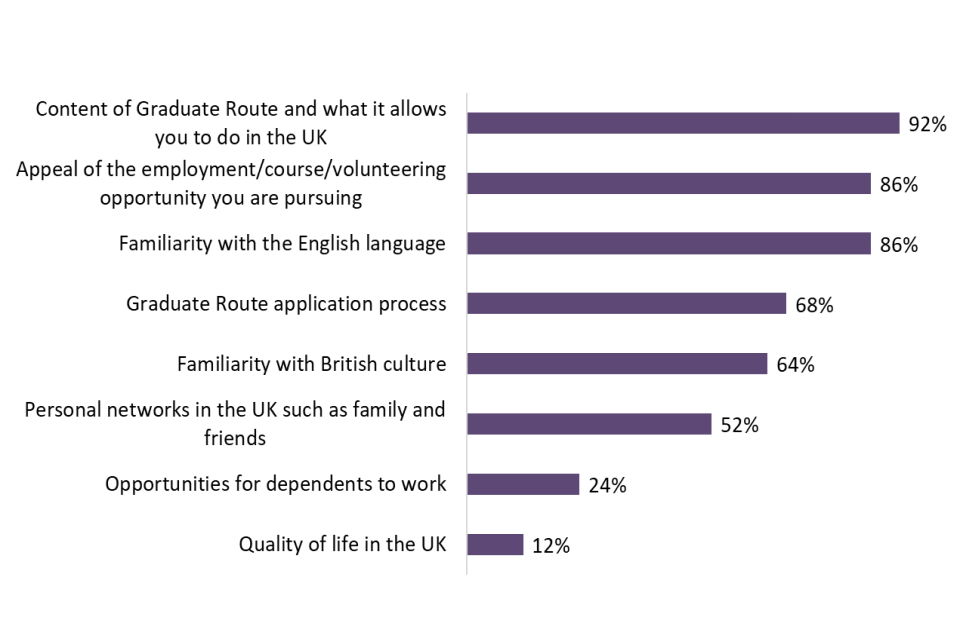
Notes:
- Which if any of the following factors were important to you when considering remaining in the UK after your studies? (base=50)
Figure 1.6: Permission holders’ reasons for selecting the Graduate route over others available internationally
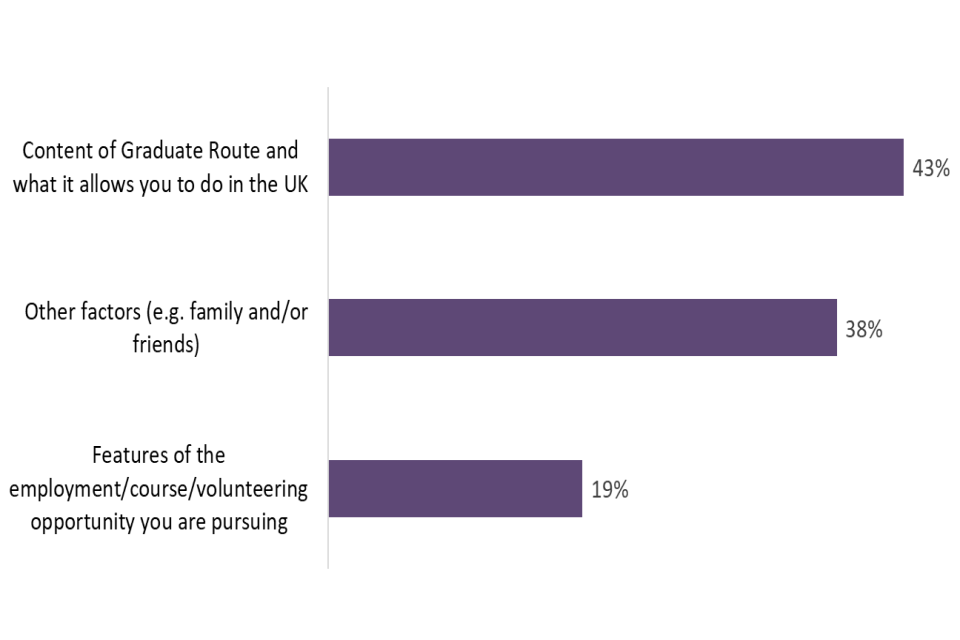
Notes:
- Why did you chose this route over other routes available internationally? (base=21)
Other countries considered were predominantly USA, Canada and Australia.
Figure 1.7: The influence of features of the Graduate route on permission holders’ decision to remain in the UK
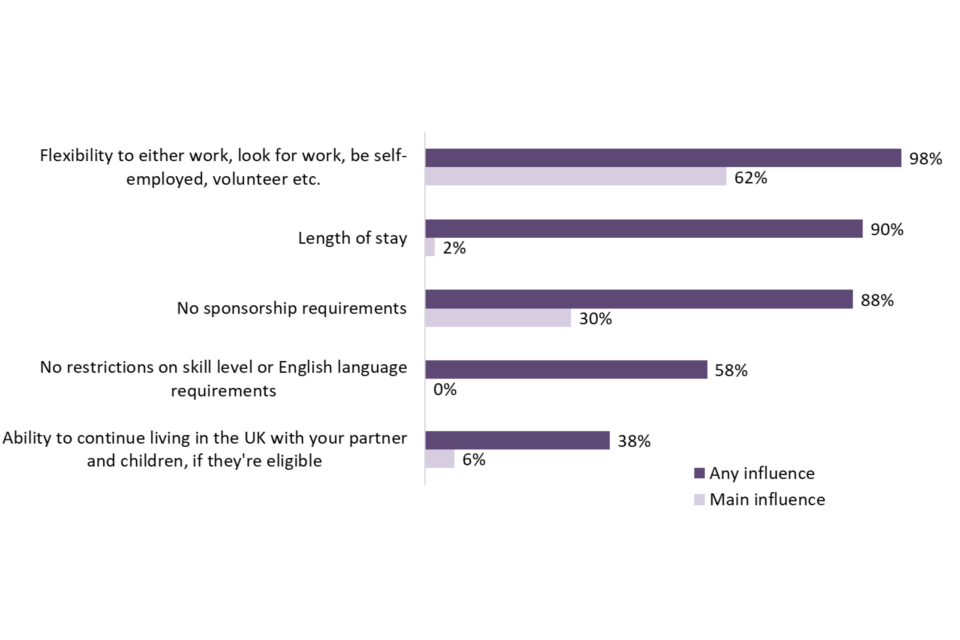
Notes:
- Did any of the following features of the Graduate Route influence your decision to remain in the UK? And which of those features had the biggest influence? (base=50)
Many of the features of the Graduate route held some influence for permission holders when deciding to remain in the UK. The flexibility to either work, look for work, be self employed or volunteer was the most important feature for many, followed by the lack of sponsorship requirements for the Graduate route.
Selecting which UK visa to apply for
More than half of those surveyed were considering applying to the Skilled Worker visa with non-STEM graduates especially interested. Many, particularly STEM graduates, were also considering the Student visa. Some postgraduates were considering applying for a Start-up visa.
Figure 1.8: Other UK visas graduates considered applying for
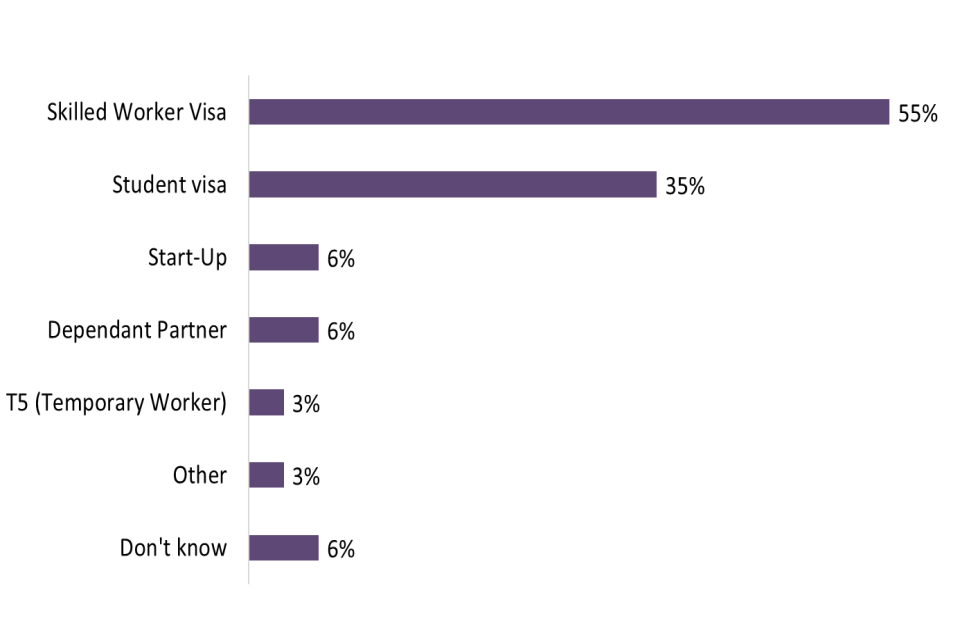
Notes:
- Which UK visa(s) did you consider applying for? (base=31)
Permission holders primarily chose the Graduate route because of the flexibility and limited requirements of the route compared to the others available to them in the UK.
“It was the most flexible option for me. It is the most welcoming option for any graduate wanting to work in UK. The fact that no sponsor was needed. Being able to work full time was beneficial. I could not find a Skilled Worker sponsor.” (Undergraduate, Non-STEM)
“The fact that there is no sponsorship required, and also the flexibility to change job within the Graduate route rather than the Skilled Worker visa.” (Postgraduate, STEM)
“The Graduate Route gave me a longer timeline to consider my options, whereas the Skilled Worker route required me to be working and employers to make a snap decision as to whether they would employ me.” (Postgraduate, STEM)
“Considering I had little time after my graduation, and there was little time to look for a job with covid restrictions, I thought this was the best option. This route was also faster than the Skilled Worker visa route and it didn’t require a sponsor.” (Postgraduate, STEM)
“Well, I think it was easy to apply. It was just sending my documents and it didn’t require any sponsorship like the Skilled Worker visa. It doesn’t ask for proof of funding, unlike the Student visa which asks whether you can fund yourself for a period of time.” (Postgraduate, STEM)
Notes:
- What made you chose the Graduate route over the other routes available? (base=32)
Experiences of the application process
Finding information on the Graduate route
Views were mixed on the ease of finding information about the Graduate route: just over half (56%) of permission holders felt it was easy; however, three in ten (30%) found it difficult.
Figure 2.1: Level of perceived difficulty felt by permission holders when searching for information on the Graduate route
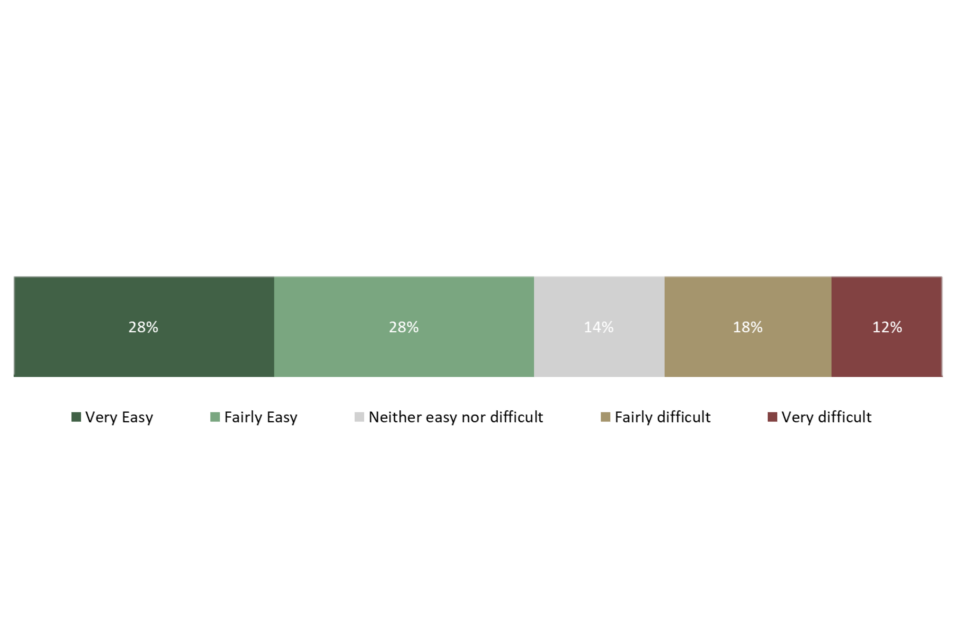
Notes:
- Can you describe how difficult it was to find information on the Graduate Route? (base=50)
Permission holders that had studied STEM subjects and those who had completed postgraduate or PhD degrees tended to think it was easier to find information on the Graduate route than non-STEM and undergraduate respondents.
Receiving help when completing the application form
Most permission holders did not receive any help in completing their application form. For those that did receive help with their application (20% of those interviewed), 60% cited family/friends as their main source of help.
Figure 2.2: The amount of permission holders who received help to complete their application form
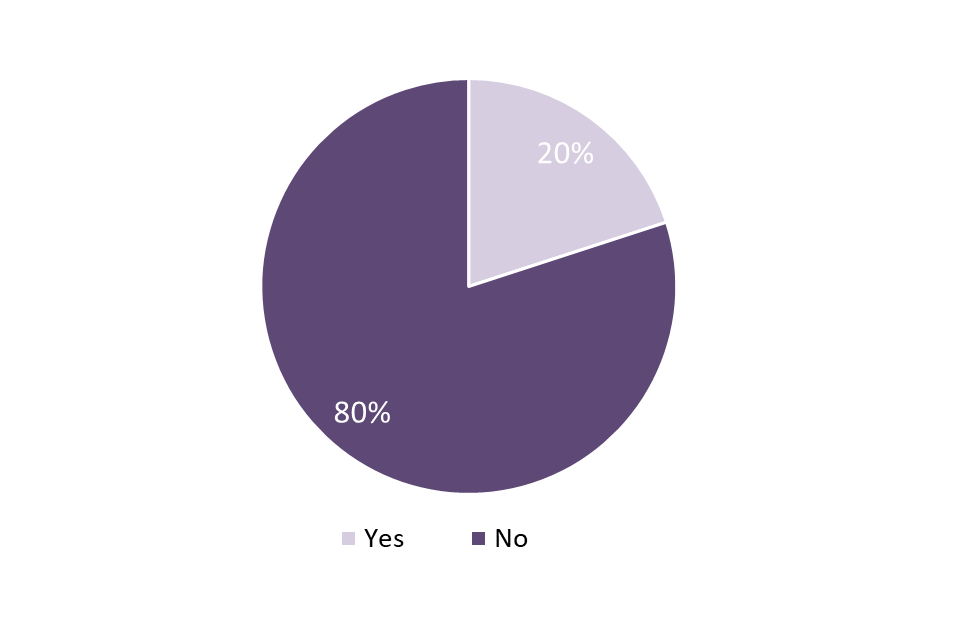
Notes:
- Now thinking about the application process, did you get help from anyone when completing your application form? (base=50)
Those who received help stated receiving assistance with scanning biometrics, proofing/checking of application, advice on what supporting documents to provide and clarification on details of dates for submission.
Figure 2.3: From where permission holders received help when completing their application
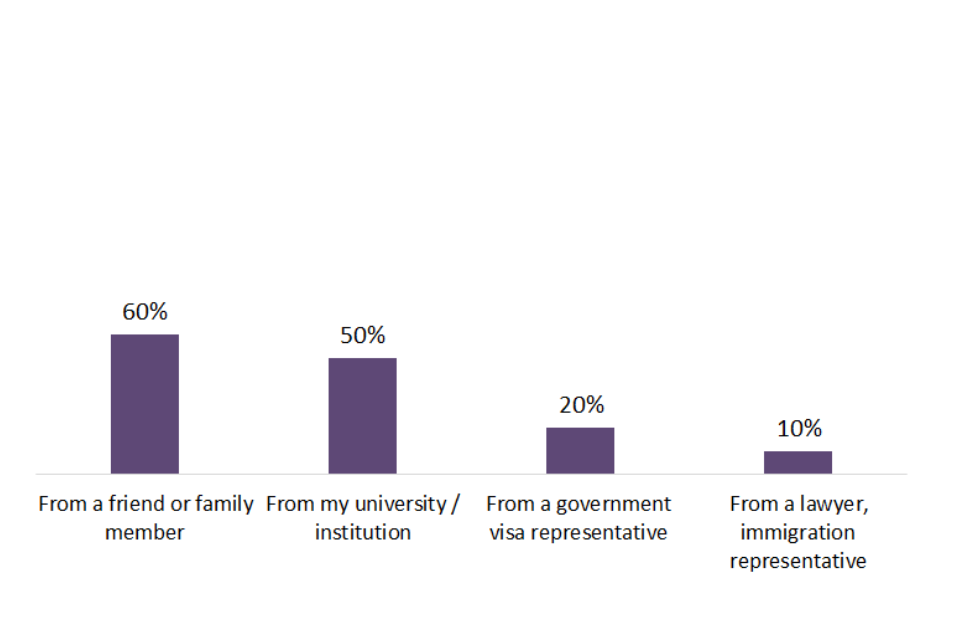
Notes:
- Now thinking about the application process, did you get help from anyone when completing your application form? (base=10)
Satisfaction with the application process
Satisfaction with the application process was high.
Figure 2.4: Permission holders’ satisfaction with the digital application process, such as use of the ID-check app and e-visa
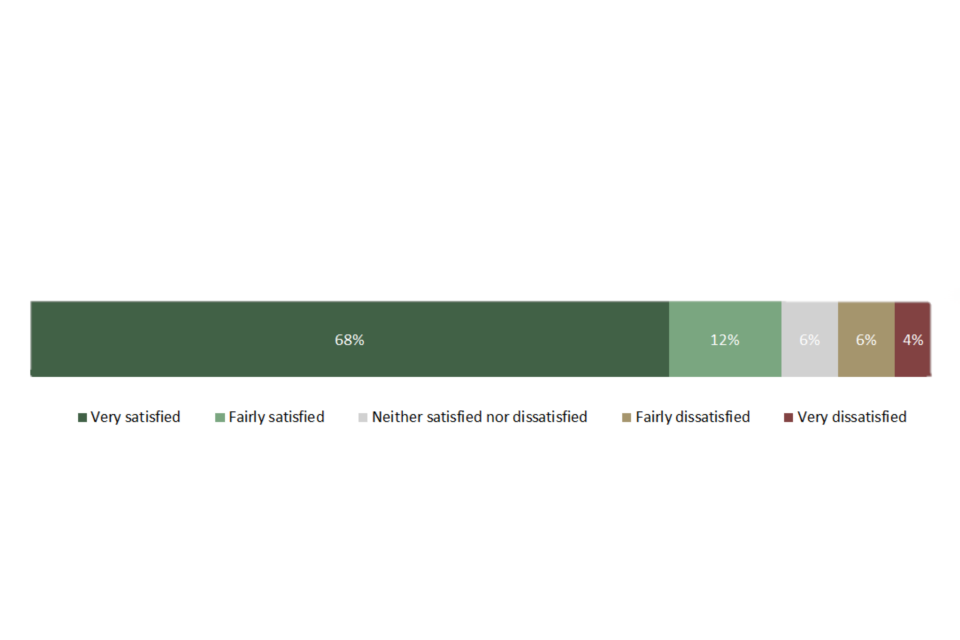
Notes:
- How satisfied were you with the digital application process specifically, for example the use of the ID-Check App and e-Visa? (base=50)
Figure 2.5: Permission holders’ satisfaction with the overall application process
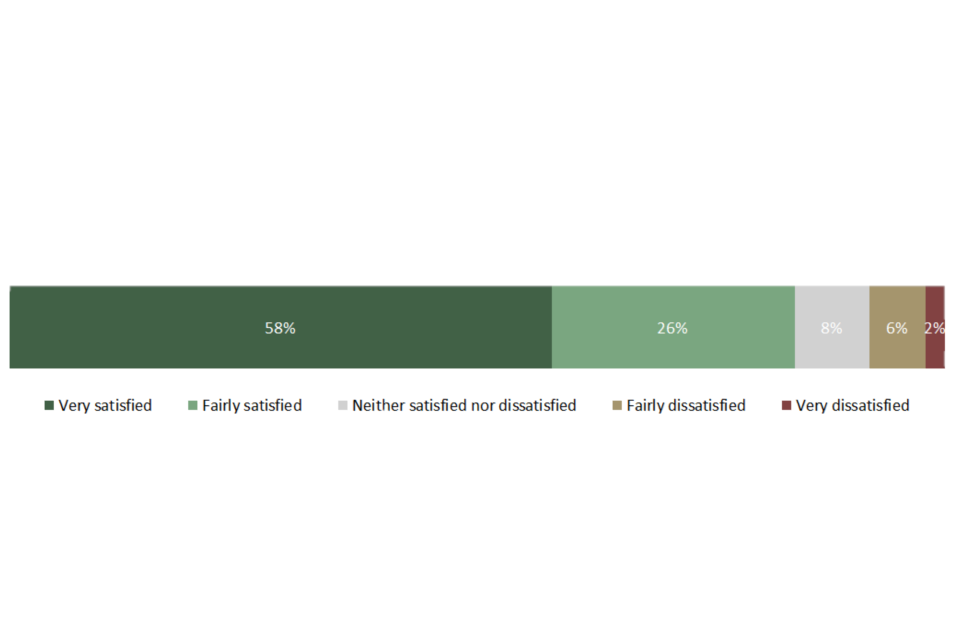
Notes:
- Overall, how satisfied or dissatisfied were you with the Graduate Route application process as a whole? (base=50)
A total of 80% of permission holders were satisfied with the digital aspects of the process, and 84% were satisfied with the overall process.
Fairness of fees associated with the Graduate route
Permission holders were split over whether the application fee and health surcharge were fair. Those qualified in STEM subjects were less likely to think the health surcharge was fair (28%) than those in non-STEM subjects (59%).
Figure 2.6: Perceived fairness of the total application fee
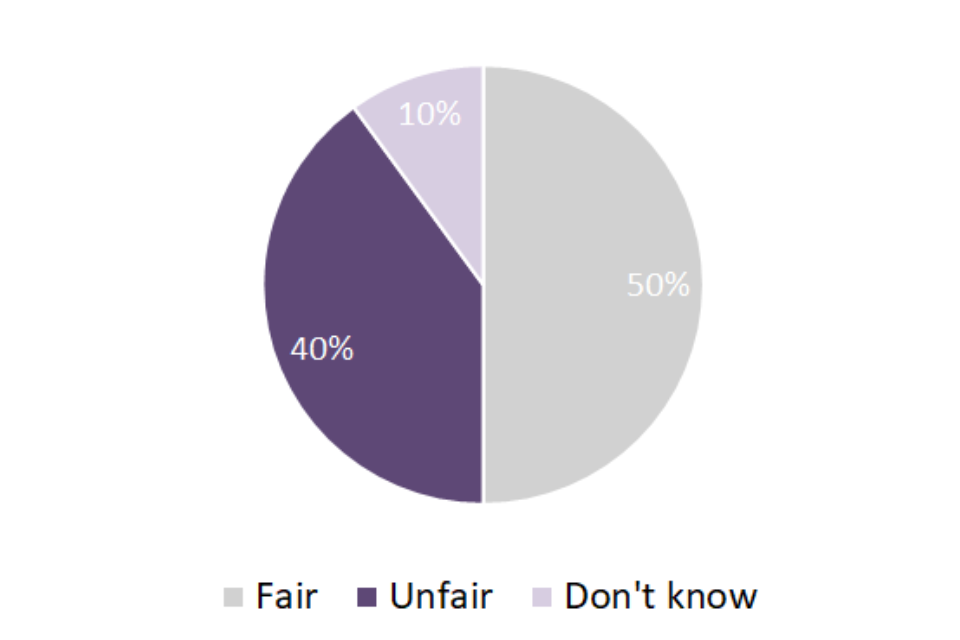
Notes:
- Thinking about the costs involved in the application process and the benefits attached to the Graduate Route, to what extent do you think the fee for each of the following was fair or unfair: (1) The total application fee? (base=50)
Figure 2.7: Perceived fairness of the healthcare surcharge
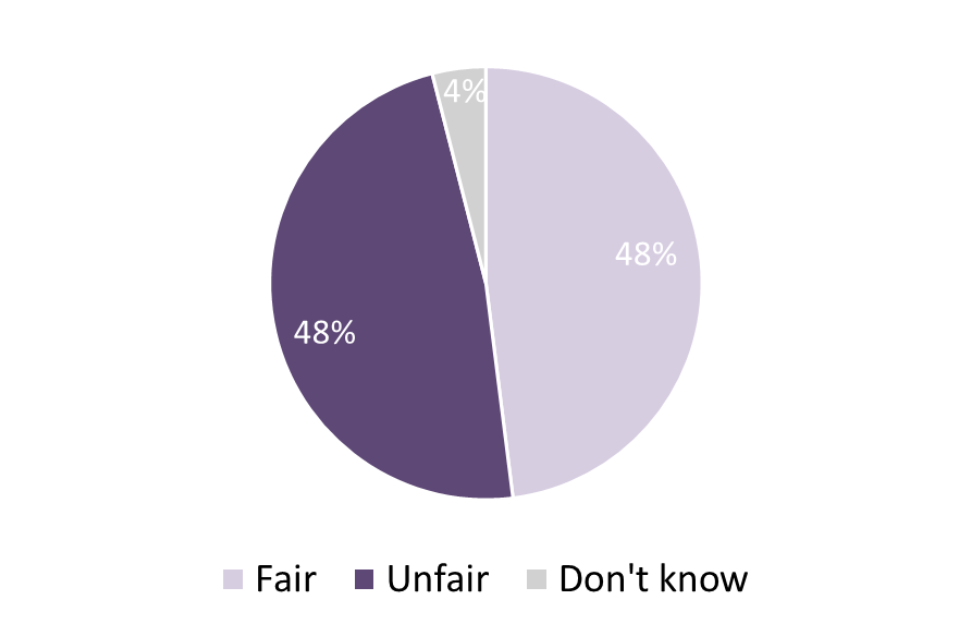
Notes:
- Thinking about the costs involved in the application process and the benefits attached to the Graduate Route, to what extent do you think the fee for each of the following was fair or unfair: (2) The annual immigration health surcharge? (base=50)
How the application process can be improved
Permission holders commonly mentioned information and guidance as key to improving the application process, with an appetite for information about the regulations that apply to the route, and the practicalities of completing the application process.
“More information on how to deal with the app. The only issue I had was the scanning of my documents on the app. It took almost 3 weeks to upload it. I even contacted the help centre, but they didn’t really help me. They just told me to use a different method. I did not try this new method, I kept on going until it worked.” (Undergraduate, Non-STEM)
“Initially when I found out about the Graduate route, it wasn’t clear how you could apply, who could apply and when could you apply.” (Postgraduate, STEM)
“I think potential availability of information and information for UK employers because as I was the first person from [company name] to go down this Graduate route, they were not familiar with the process and didn’t understand what type of contracts I was allowed to sign or other general restrictions.” (Postgraduate, Non-STEM)
“The digital application was not clear on alternative options if the process did not work or if the mobile device used was not compatible with the system, so more information on alternatives would be useful.” (Postgraduate, Non-STEM)
Notes:
- What can be done to improve the application process? (base=50)
Permission holders’ current and future plans
The present employment status of permission holders
All permission holders were using the route for labour market related activity, either through employment (74%), self-employment (2%) or seeking employment (24%). None were studying or doing voluntary work.
Half (51%) of those in employment were offered their role before applying for the Graduate route.
Figure 3.1: Current employment status of permission holders
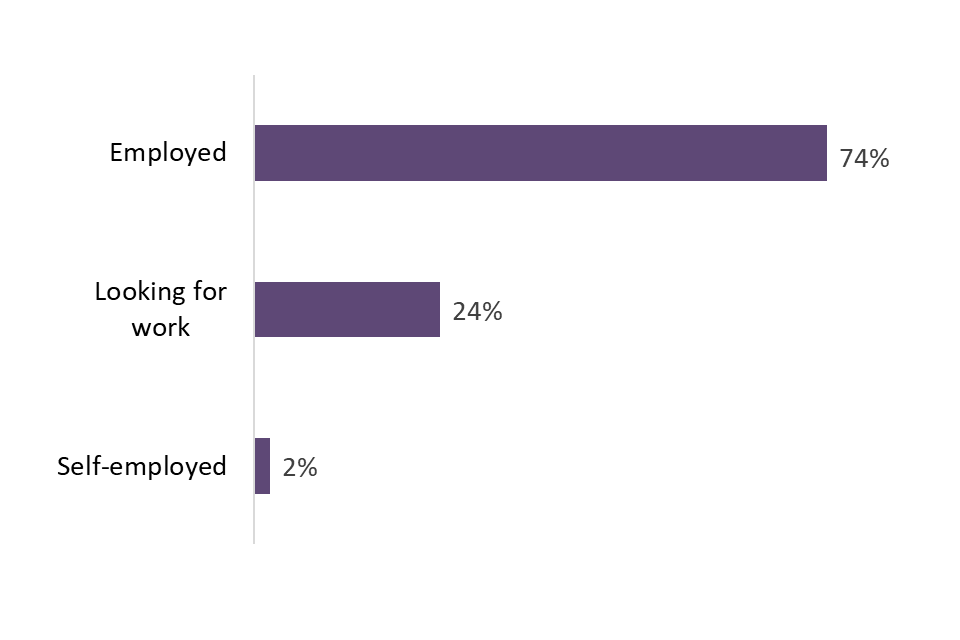
Notes:
- Which of the following best describes your current situation in the UK? (base=50)
The job profile of employed permission holders
Most of those in employment held professions or associate professional level roles.
Figure 3.2: The current occupation of employed permission holders
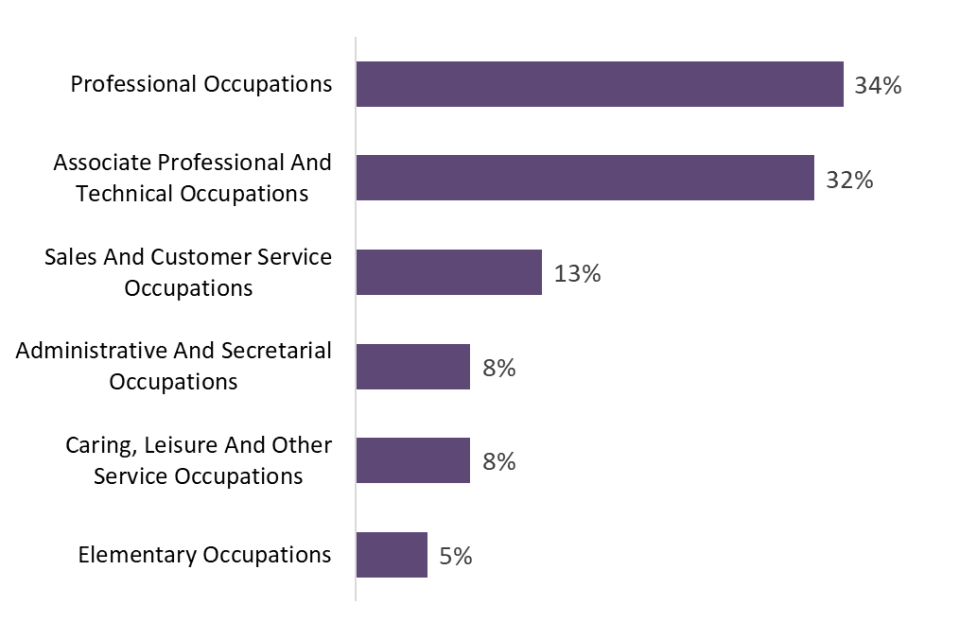
Notes:
- What is your occupation/job role? (base=38)
The median salary of permission holders was £20k to £30k.
It was more common for those who held postgraduate or STEM qualifications to report earnings over £30k than those with undergraduate degrees or qualified in non-STEM subjects.
Figure 3.3: The personal annual income of Graduate permission holders
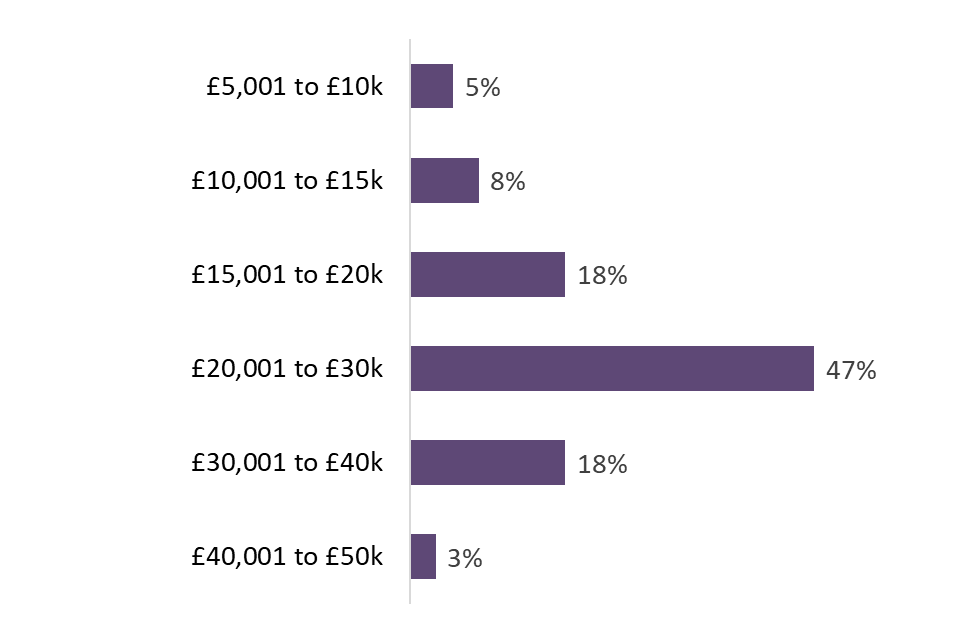
Notes:
- Which of the following best describes your personal annual income? (base=38)
Figure 3.4: The main sector activity of permission holder’s employers
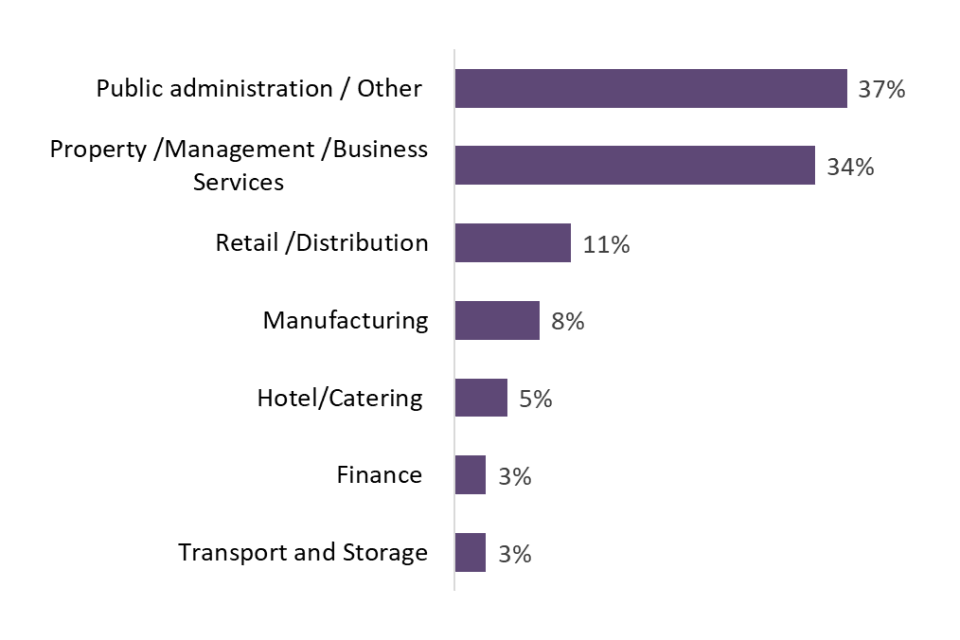
Notes:
- What is the main activity of your business? (base=38)
Selecting a job role within the UK
Career or personal progression were the most common motivations for choosing a specific role. It was rare for permission holders to reference any motivations related to visa restrictions.
Figure 3.5: Factors impacting permission holders’ choice of UK job role
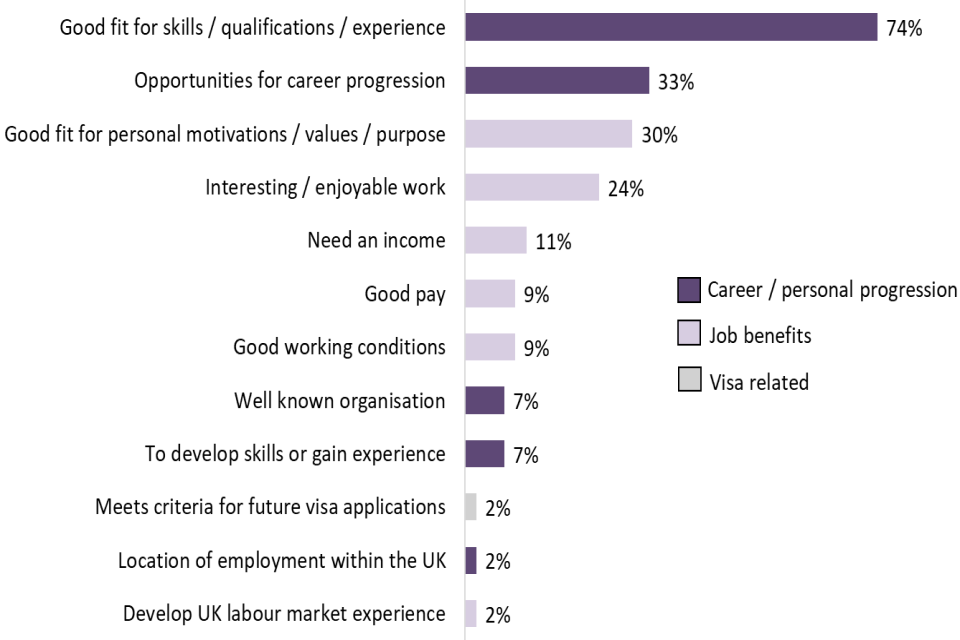
Notes:
- What are the main reasons for choosing this job/role? Includes those seeking/applying for a specific role as well as those currently employed. (base=46)
Changes to employment status whilst on the Graduate route
Two in five (42%) Graduate route permission holders plan to change job before the end of their visa.
Figure 3.6: Permission holders’ intentions to change their current route activities in the future
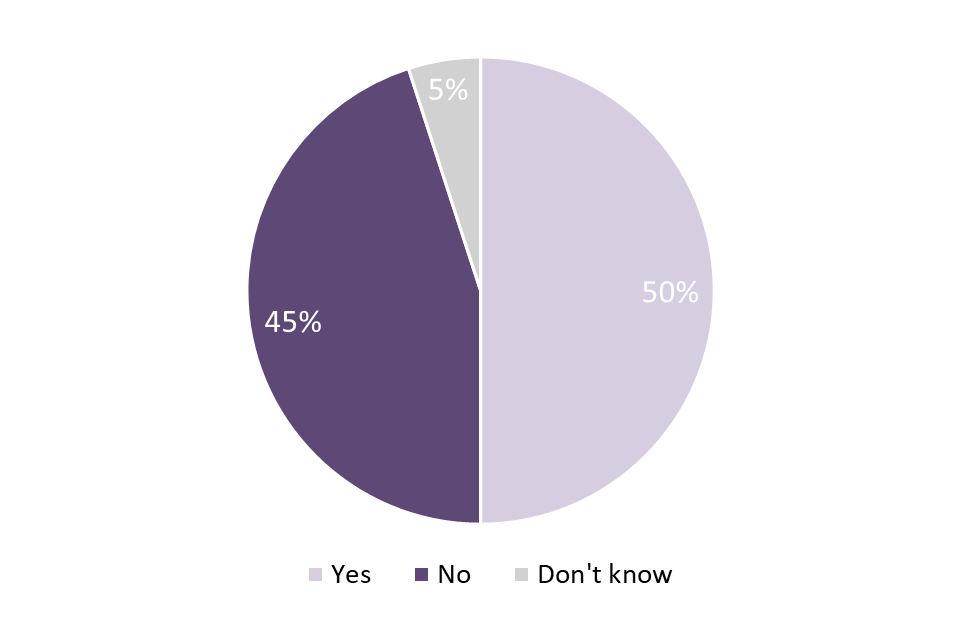
Notes:
- Do you plan to continue what you’re doing at the moment for the duration of your Graduate permission or are you planning to do something else? (base=38)
Figure 3.7: Permission holders’ type of intended change of Plan on the Graduate route
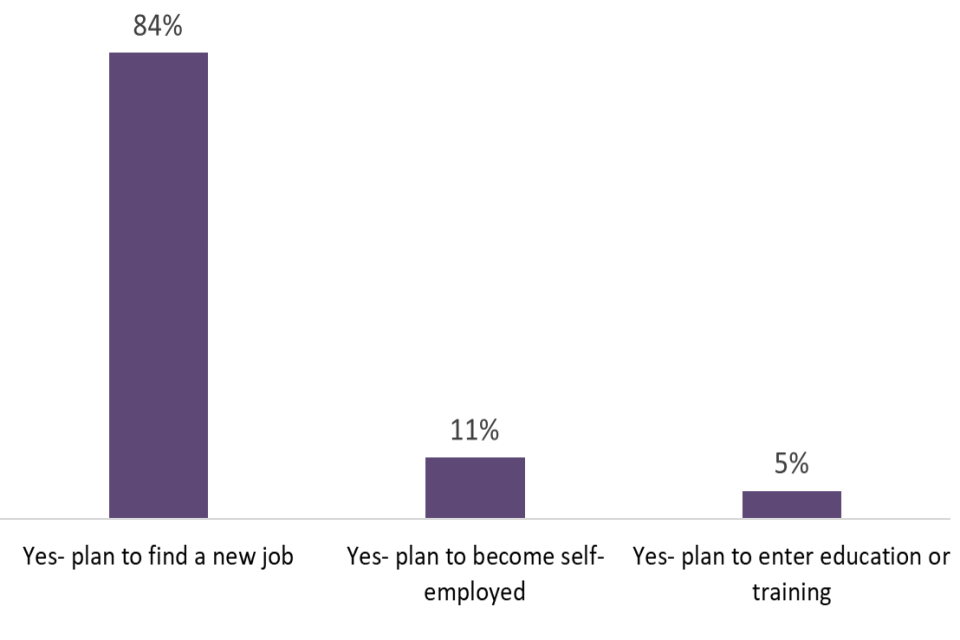
Notes:
- Do you plan to continue what you’re doing at the moment for the duration of your Graduate permission or are you planning to do something else? (base=19)
The main motivation for wanting to change job was to move into employment in their field of study/qualification.
“The job role is great, but this is not the field I studied in; I have a different specialisation.” (Postgraduate, Non-STEM)
“I am completing my professional medical exams and once I pass I will be able to practice medicine in the UK (as a doctor).” (Postgraduate, STEM)
“Because my training only lasts for one year, and then I will look to become self employed as a pharmacist.” (Undergraduate, STEM)
“I’ve been looking for other full-time positions, but it has been hard to find one which allows me to start immediately. I want to work as a translator or interpreter in Japanese companies in the UK.” (Undergraduate, STEM)
Notes:
- Why do you plan to change what you’re doing? (base=20)
Permission holders’ plans for the future
Most permission holders plan to stay in the UK and move onto another visa.
Figure 3.8: Permission holders’ intended length of stay in the UK
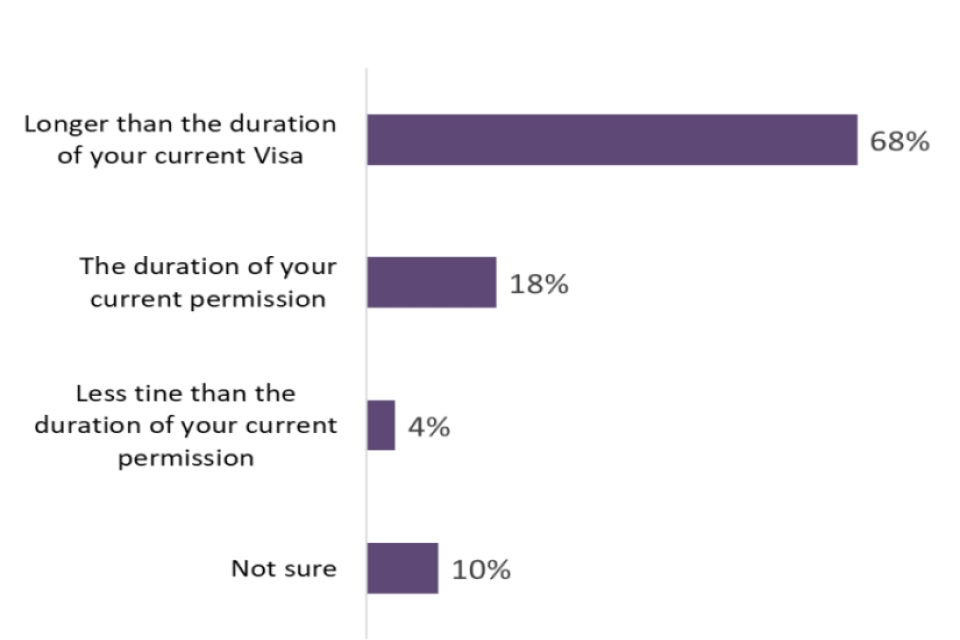
Notes:
- How long do you intend to stay in the UK? (base=50)
Figure 3.9: Permissions holders’ intentions to switch to another UK visa
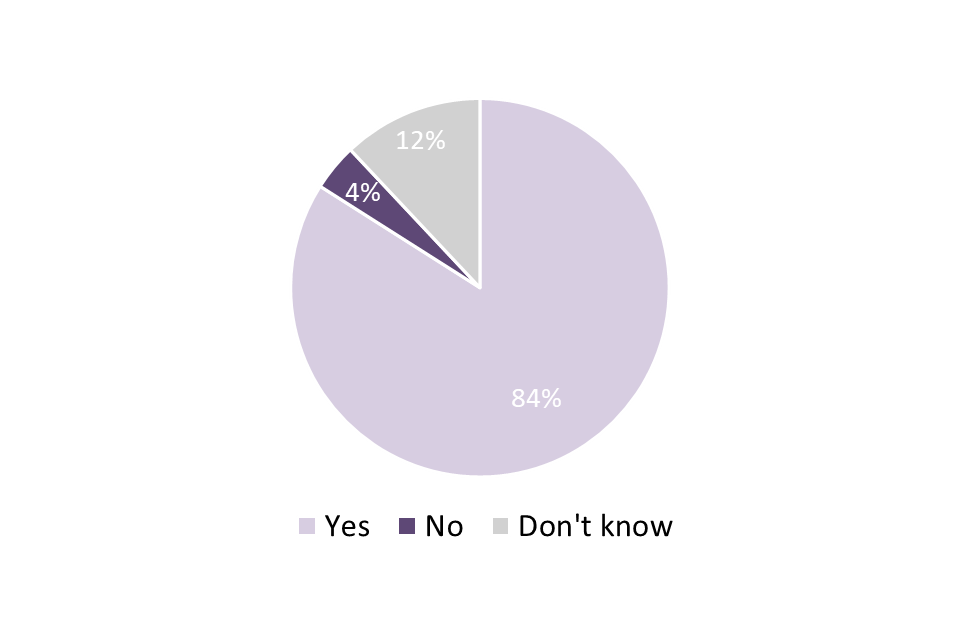
Notes:
- Do you intend to switch to another UK visa route in the future? (base=50)
Many are considering the Skilled Worker visa as the most likely way for them to get indefinite right to remain. In contrast to the Graduate route, the Skilled Worker route does count towards the right to remain.
“The one that has no restrictions on time. I’m not sure what it is called. I think it’s Tier 2.” (Undergraduate, STEM)
“The Skilled Worker visa, probably after this visa runs out because I will be eligible for indefinite leave after 10 years, so after this visa runs out and I find an employer to sponsor me for 3 more years, that will be the easiest way for me to stay.” (Undergraduate, Non-STEM)
“Skilled Worker Visa – Once my current visa runs out, it would be my route to stay in the UK. If I stay long enough in the UK, it will let me naturalise.” (Undergraduate, STEM)
“Not quite sure of the name. If your partner is a UK citizen you can apply to stay for 2 years, but if I got this visa and we split up, then I would have to go back to my home country.” (Postgraduate, STEM)
Notes:
- What are the main reasons for choosing this job/role? (base=42)
